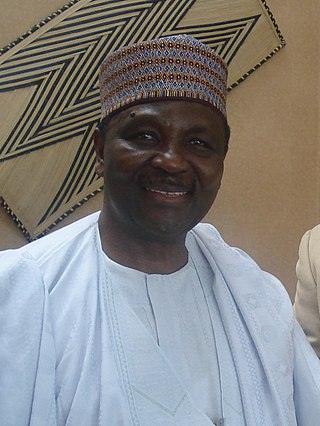
Yakubu Dan-Yumma "Jack" Gowon is a retired Nigerian army general and military leader. As head of state of Nigeria, Gowon presided over a controversial Nigerian Civil War and delivered the famous "no victor, no vanquished" speech at the war's end to promote healing and reconciliation. The Nigerian Civil War is listed as one of the deadliest in modern history, with some accusing Gowon of crimes against humanity and genocide. Gowon maintains that he committed no wrongdoing during the war and that his leadership saved the country.
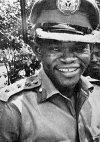
Benjamin Adesanya Maja Adekunle was a Nigerian Army Brigadier and Civil War commander.
Lieutenant Akintunde Akinsehinwa was the aide-de-camp to Murtala Ramat Muhammed, the military ruler of Nigeria from 1975 to 1976. He was killed alongside his boss during the February 1976 coup.
Mons Officer Cadet School was a British military training establishment for officer cadets in Aldershot from 1942 to 1972, when it was closed and all officer training concentrated at Sandhurst. The training course at Mons was for National Service and Short Service Officer Cadets, Territorial Army officers, and those joining the Regular Army as graduates, except for infantry officers. It was relatively short, usually lasting only six months or even less, compared with two years at Sandhurst.
Operation OAU was a battle between Nigerian 3 Marine Commando Division (3MCDO) and Biafran 12 Division in modern day south-eastern Nigeria. Operation OAU was an intermittent battle that may have resulted in over 25,000 deaths on both sides. Although the Biafran soldiers were outnumbered, they were able to retain control of Umuahia and eventually recapture the cities of Owerri and Aba.
The siege of Owerri was a battle between Nigerian and Biafran forces in the Nigerian Civil War. The capture was a major victory for the Biafrans because the victory opened up telephone lines, enhanced road telecommunications, and showed that with stiff resistance, Biafra could defeat Nigerian forces.
The Invasion of Port Harcourt was a military conflict between Nigerian and Biafran military forces.
Operation Tail-Wind was the final military conflict between Nigeria and Biafra. The operation took place in the towns of Owerri and Uli, both of which were captured by Nigerian forces. The operation ended with General Odumegwu Ojukwu fleeing to the Ivory Coast and then president of Biafra Philip Effiong surrendering to Olusegun Obasanjo.
Operation Tiger Claw was a military conflict between Nigerian and Biafran military forces. The battle took place in the major port of Calabar. The Nigerian were led by Benjamin Adekunle while the Biafrans were led by Maj. Ogbo Oji. The aftermath was a major loss to the Biafrans because it cost the Biafrans one of their largest ports.
The Abagana Ambush was an ambush by Biafran guerrilla troops led by Major Jonathan Uchendu that wiped out the Nigerian 2 Division. Of the 6,000 Nigerian troops ambushed, only a very small number survived, including the 2nd Division's commander, General Murtala Muhammed.
Operation Leopard was a military operation conducted against Biafran troops defending Umuahia. No fighting took place inside Umuahia but the area surrounding it was heavily devastated by the Nigerian offensive. Umuahia was finally captured by Nigerian troops on April 22, 1969.
Akpan Utuk was a strategic and successful colonel in the Biafran Army.
Operation Hiroshima was a military operation conducted by the Biafran 4th Commando Brigade in an attempt to recapture Onitsha from the Nigerian 2nd Division. The operation ultimately resulted in failure and ended in the deaths of numerous mercenaries and Biafran soldiers.
Ogbunigwe, also called Ojukwu Bucket, was a series of weapons systems including command detonation mines, improvised explosive devices, and rocket-propelled missiles, mass-produced by the Republic of Biafra and used against Nigeria between 1967 and 1970 in the Nigerian Civil War.
Ogbugo Kalu was a former army officer who served in both the Nigerian Army and Biafran Army. Kalu was also commander of the Nigerian Military Training College (NMTC) in Kaduna following the 1966 Nigerian coup d'état.
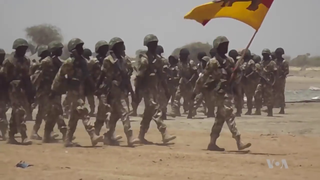
The 3rd Armoured Division is a division of the Nigerian Army. The division is headquartered at Jos, Plateau State.
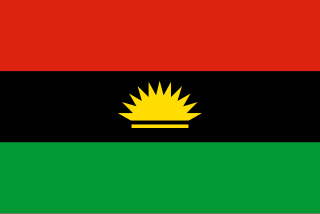
The Biafran Armed Forces (BAF) were the military of the Nigerian secessionist state of Biafra, which existed from 1967 until 1970.

The 2 Division, Nigerian Army is a division, active since the Nigerian Civil War. Its headquarters are now at Ibadan in the South-West. The current and 45th General Officer Commanding is Major General Bamidele Alabi.
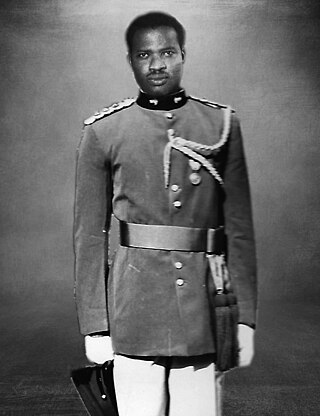
Ejike Ebenezer Obumneme Aghanya was a military officer and electrical engineer who served in the Nigerian Army and the Biafran Armed Forces, retiring as a colonel. Accused of involvement in the 1966 Nigerian coup d'état he was arrested and imprisoned without trial until the outbreak of the Nigerian Civil War where he served on the side of Biafra, holding key positions in the Biafran Armed Forces. He was the head of the Biafran Agency for Research and Production (RAP) which produced bombs, rockets, missiles, as well as ammunition, armored vehicles, telecommunication gadgets and petroleum refineries among others for the Biafran Armed Forces. Later he was the Chief of Staff of the Biafran Organisation of Freedom Fighters (BOFF) which was the guerrilla warfare and special operations arm of the Biafran Armed Forces. He also served as Battalion Commander, 44th Electrical and Mechanical Engineer Battalion Biafran Army and later Brigade Commander of the 58th Brigade of 12th Infantry Division Biafran Army during the war.







